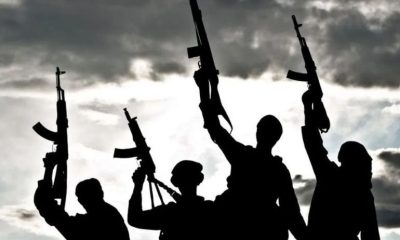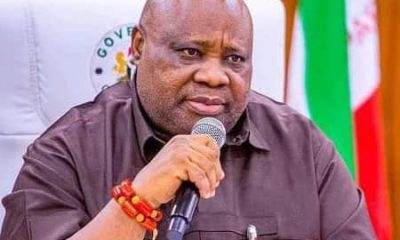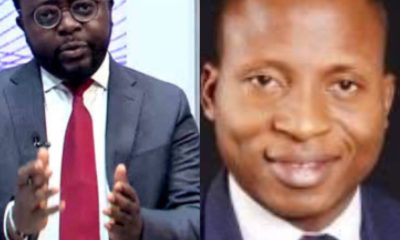Opinion
Alex Saab Case – UN Report Makes Cape Verde’s Position Unsustainable And Indefensible

Why do the Government and the Cape Verdean courts judge themselves to be competent and able to decide just who may or may not be a special envoy or ambassador of a foreign, sovereign country and a member of the United Nations? This is a legitimate question to ask when analyzing the case of Alex Saab, who the Cape Verdean police arrested during a stopover on the island of Sal en route to Iran, on a mission from the Government of Venezuela to his counterpart in Tehran.
In the opposite situation, that is, in the case of a special envoy, duly identified and carrying official correspondence addressed by the President of the Republic, Jorge Carlos Fonseca, to a similar head of state, Cape Verdeans would never accept that this diplomat be arrested and subject to an extradition process to a country that seeks to enforce its laws abroad, under an alleged extraterritoriality that goes head-on against the very rules of international law.
Now, in the Alex Saab / Venezuela case, Cape Verde has, since the beginning, uninfluenced by what international treaties, conventions and agreements stipulate, both in terms of bilateral commitments – since there is no extradition agreement signed with the United States – such as ECOWAS, the African Bar Association and the United Nations. This almost unanimous understanding was, moreover, clearly expressed, a few days ago, by the African Bar Association, an unsuspected and highly prestigious civil entity, which has existed for longer than Cape Verde has as an independent country!
In this scenario, the United Nations itself now condemns the actions of the United States – and in passing the blind alignment of Cape Verde – in its strong-arm tactics with Venezuela, namely the inequity of the sanctions imposed on that Latin American country and the judicial persecution, on the basis of an absolutely illegal extraterritoriality, with the victims being the business and diplomatic agents mandated to circumvent and minimize, through business partnerships with friendly countries, the brutal effects of the American embargo on the economy, society and daily life of ordinary Venezuelan citizens.
Among these agents is Alex Saab, whose name is not mentioned but who is widely referenced, due to his profile and the specific circumstances of his situation, in the strong criticisms of the United States’ actions, contained in a report drawn up following a mission carried out in the first half of February to Venezuela and which will be presented to the United Nations Security Council later this year by the organization’s Special Rapporteur, Alena Douhan.
During this visit, this high-ranking UN official contacted numerous members of the Government, in addition to the President and Vice-President of the Republic of Venezuela, trade unions, business and civil society corporations, non-governmental organizations, human rights organizations and bodies and the population itself, having also been on the ground to verify people’s daily reality.
According to the report, the unilateral sanctions of the United States, which were later backed by its main partners, namely the European Union and Canada, have a strong negative impact on all spheres of life in the country, severely affecting, not only the public-administrative universe as well as the economy and the public and private business sector of Venezuela.
To justify this embargo, almost universal in terms of scope, the United States accuses the Caracas executive, its leaders, the business class and public and private entities close to the regime, of every type of crime, namely drug trafficking, money laundering, widespread corruption, violation of human rights, terrorism, organization of fraudulent elections and persecution of political opponents, amongst others.
The American administration does not recognize the current President of the Republic nor the respective Government, preferring to consider the existence of another head of state, the leader of the opposition, who has never won elections and was therefore not elected. The sanctions of the United States thus arise and originate as a way to bring down the Government of Venezuela, through economic pressure and the social crisis, and to promote the seizure of power by those on their side.
Through these sanctions, the international banking system rejects the opening and maintenance of accounts, abroad, of the national public and private business sector, which is thus prevented from importing and exporting goods and services, with serious consequences for supplying the Venezuelan market and for the consumption of the population. At the same time, the embargo caused industry to collapse, which cannot import raw materials to produce and export, or serve domestic consumers.
Electricity in the country – which has one of the world’s largest oil reserves and whose economy is mono-directional, that is, there is one-way to exploit that wealth – only works at 20 per cent of its capacity, public services have laid off more than 50 percent of its workforce, food imports are not viable, which has an impact on the exponential increase in malnutrition, the breakdown of families is a reality, most schools are closed, academic failure and student dropout are rampant and crime is on the rise.
In health, Venezuela is entirely dependent on the import of medicines, which meanwhile, sanctions do not allow, hospitals have lost 70 percent of their medical personnel, only 20 percent of equipment works, maternal and neonatal mortality has reached unbearable levels, there are no vaccines and the country cannot even cope with the Covid 19 pandemic.
The report by Alena Douhan states that the basis of the sanctions against Venezuela, successively reissued since 2015 by the United States, does not meet the criteria of Article 4 of the International Convention on Civil and Political Rights on which they are based, adding that they violate sovereign rights of the country and prevent the Government from effectively exercising its obligations to guarantee the needs of the population.
And it is precisely to ensure that these needs are met that the Venezuelan Government has used supply programmes operated by servers such as Alex Saab, the UN Special Rapporteur stresses, adding that sanctions and judicial harassment, based on illegal extraterritoriality practiced by States, “violate the presumption of innocence” of these individuals, in addition to the fact that the charges against them “do not constitute, for the most part, international crimes” so “they are not subject to universal criminal jurisdiction”.
The Special Rapporteur emphasizes that applying U.S. extraterritorial jurisdiction to Venezuelan companies and compelling third states to comply with their dictates “is not justified under international law and increases the risks of causing adverse effects”, in addition to “violating the rights of agents of the Government of Venezuela to represent it on the basis of the principle of sovereign equality of States”
It is on the basis of these arguments that Alena Douhan determines, in her report, “the Inadmissibility” of the application, by the United States, of sanctions and other extraterritorial measures, and asks that country to review such measures, namely, and, in the first place, the embargo on the international sale of Venezuelan oil, currently the country’s only source of revenue.
-

 News4 days ago
News4 days agoInsecurity: Kogi Schools Resume On Monday
-

 Opinion4 days ago
Opinion4 days agoDon’t Pull the Plug: Why Nigerians Are Pleading for the U.S. to Extend Its Police Training Program — and Why It Must Synergize With New Military Arrivals
-

 Crime3 days ago
Crime3 days agoVigilante Reportedly Shoots Colleague Dead In Plateau
-

 Crime4 days ago
Crime4 days agoMan Shot Dead In Ambush Along Jol-Sho Road In Plateau













